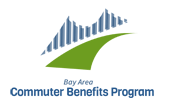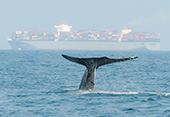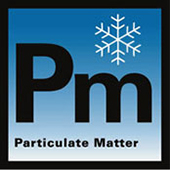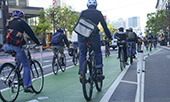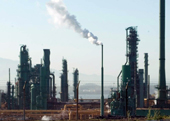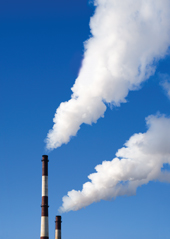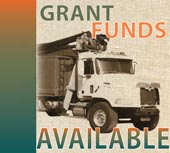|
|

|
|
|
|
August 2017 l Volume 2017-3
|
|
|
|
|
|
|
Welcome to the latest issue of the Bay Area Air District’s Air Currents newsletter. In this issue, you’ll find articles about the Air District’s enforcement of the Bay Area Commuter Benefits Program, the expansion of a program to reduce shipping pollution and protect whales in the Bay Area, and the Bay Area’s achievement of the federal PM standard. Other articles cover the Air District’s Bike to Work surveys and recent financial settlements with local refineries. A summary of current grant opportunities is also included.
|
|
|
|
|
|
|
|
|
|
|
|
|
| | |
Air District Steps Up Enforcement of the Commuter Benefits Program
|
|
The Air District is warning unregistered Bay Area employers who are subject to Bay Area Commuter Benefits Program requirements that they could face financial penalties for not coming into compliance with the 2016 regulation. The Bay Area Commuter Benefits program requires employers in the region with 50 or more full-time employees to register and provide commuter benefits to their employees. If they fail do so, they can face violations and fines.
The Air District notifies employers subject to the program that they must register at 511.org. The Metropolitan Transportation Commission’s 511 Commuter Benefits Specialists will help employers comply with the program. To get more information, employers can visit 511.org and click on “Bay Area Commuter Benefits Program,” or call 511 and say “commuter benefits” at the first prompt to connect to employer outreach staff. Detailed information about employer requirements can also be found in the “Employer Guide” at the Bay Area Commuter Benefits program page.
The Air District and MTC initially developed the Bay Area Commuter Benefits Program as a pilot program in response to Senate Bill 1339. Last year’s Senate Bill 1128 authorized the Air District and MTC to jointly continue the program.
Qualifying employers are required by law to register for the program, select a commuter benefit option and offer it to their employees. The program’s goal is to reduce greenhouse gas emissions and traffic congestion by encouraging employees to adopt commute alternatives to driving alone. Research shows that employees are more likely to consider alternatives to driving alone if they are encouraged by their employer.
The program offers employers various options for compliance, such as enabling employees to pay for transit or vanpooling with pre-tax dollars, which can save both employers and employees money through lower taxes. When employees choose the pre-tax benefit option, the reduction in taxable income allows employers to reduce their Social Security and Medicare payroll taxes. Employees themselves can save as much as 40 percent on the cost of their monthly transit or vanpool expenses by setting the funds aside pre-tax.
As of late last year, nearly 4,100 employers were enrolled in the program and approximately 1.3 million employees were receiving commuter benefits, primarily via pre-tax dollars. Close to 57 percent of enrolled employers had previously not offered commuter benefits.
|
|
|
|
|
|
|
|
|
|
|
|
|
| | |
Air District Helps Vessel Speed Reduction Program Expand to Bay Area
|
|
In an initiative to cut air pollution and protect whales, the Vessel Speed Reduction voluntary incentive program has expanded to include the San Francisco Bay Area. The program began in the Santa Barbara Channel region as a partnership between the Santa Barbara County Air Pollution Control District, NOAA’s Channel Islands National Marine Sanctuary, the Ventura County Air Pollution Control District, the National Marine Sanctuary Foundation, and the Volgenau Foundation. As a result of incentives provided by the program, 50 ship transits were slowed to 12 knots or less, eliminating more than 25 tons of smog-forming nitrogen oxides and more than 1,000 metric tons of greenhouse gases. Ten global shipping companies participated in the 2016 Program: CMA CGM, Evergreen, Hamburg Sud, Hapag Lloyd, Holland, K Line, Maersk, MOL, NYK Line, and Yang Ming.
In 2017, the partners will continue to implement the program in the Santa Barbara Channel region, and are being joined by the Bay Area Air District and the Cordell Bank, Greater Farallones, and Monterey Bay National Marine Sanctuaries to extend the program to the San Francisco Bay Area.
This year, more than $185,000 in funding is planned to incentivize slow-speed transits, potentially more than doubling the number of slow-speed transits from 2016. For 2017, the incentive program will provide a maximum possible incentive of $2,500 for transits that slow to 10 knots in both regions in a single trip. The expanded program started July 1 and will continue until November 15.
Ships travelling along the California coast emit a large amount of smog-forming pollution, and ship strikes are a major threat to recovering endangered and threatened whale populations, including blue, humpback and fin whales. Slowing ship speeds reduces air pollution and decreases the risk of fatal ship strikes on whales.
|
|
|
|
|
|
|
|
|
|
|
|
|
|
| | |
Bay Area Achieves Federal PM Standard
|
|
This May, the Bay Area achieved a significant air quality milestone: The U.S. Environmental Protection Agency has determined that the nine Bay Area counties have successfully attained the fine particulate matter, or PM2.5, air quality standard. Eleven years after the U.S. EPA first adopted the health-based requirement for fine particulate matter 25 microns or smaller in size, the Bay Area has achieved the air quality standard - set at 35 micrograms per cubic meter based on a 24-hour average concentration.
Air District and state actions, such as the 2008 Wood Burning Rule and stationary and mobile diesel engine controls, have substantially reduced fine particle pollution in the region. Since 2009, the Air District has also directed over $100 million in grant funding to reduce air pollution around local ports by cleaning up or replacing older, dirtier trucks and electrifying shipping berths.
PM2.5, consists of microscopic solid particles or liquid droplets that can either be emitted directly into the air or formed by chemicals reacting in the atmosphere. It is produced during the combustion of gasoline and diesel fuels, and during power generation and residential wood burning. Fine particulate matter is a serious health concern: these microscopic particles can evade the body’s natural defenses and penetrate deep into the lungs where they may cause serious health effects.
Federal ambient air quality standards are set to protect public health. The Air District will work to maintain this clean air standard and continue to reduce fine particulate matter in heavily impacted communities.
|
|
|
|
|
|
|
|
|
|
|
|
|
|
| | |
Air District Surveys Bike to Work Day Participants
|
|
The Air District has long promoted biking as an alternative to driving. Simply replacing motor vehicle trips with bicycling whenever possible can improve regional air quality by reducing exhaust emissions and greenhouse gases. The Air District has been a regular supporter of Bike to Work Day efforts throughout the Bay Area. Each May, Bike to Work Day encourages commuters to make the switch from four wheels to two. Thousands of people across the region take part in the annual event, biking at least a portion of their commute and helping to reduce Bay Area emissions.
For the last few years, the Air District has surveyed participants of Bike to Work Day and discovered some interesting data regarding commuter behavior change.
Of those surveyed, seven percent reported regularly driving alone to work and nine percent stated that this was their first time attempting to bike to work - encouraging data, as it showed those who normally drove to work were attempting to alter their commuting habits for the better.
Seventy-five percent reported that their employers have bike amenities at work - such as bike racks, changing rooms and showers - a factor that has been shown to encourage bike commuters. Also, 60 percent of those surveyed mentioned that they would commit to biking to work at least one day a week or more in the year ahead, another sign that commuters are cycling away from the cumbersome, congested car commute.
Besides supporting Bike to Work Day events, the Air District encourages efforts to make biking a safer and more viable transportation alternative by funding bicycle infrastructure projects in the Bay Area. With new bikeways and secure bike parking across the region, residents and commuters can more easily shift to biking as an alternative to driving, helping reduce pollution and prevent Spare the Air alerts.
Every time Bay Area residents choose to bike instead of drive, they benefit us all by helping to reduce congestion and improve air quality in the region. Thanks to all those Bay Area bikers for helping us Spare the Air!
|
|
|
|
|
|
|
|
|
|
|
|
|
| | |
Air District Settles Case with Chevron USA Inc.
|
|
In May, Chevron USA Inc. agreed to pay the Air District $181,000 to settle air quality violations at its refinery in Richmond. The settlement covers 26 Notices of Violation issued for air quality violations at the Richmond Oil Refinery during 2013 and 2014. The violations include failures to catalogue and monitor equipment for fugitive emissions leaks, excess sulfur compounds in fuel gas, excess carbon monoxide emissions from furnace operations, failure to properly depressurize process vessels, and public nuisance complaints due to smoke from flaring.
All the violations that led to this settlement have been corrected.
The Air District issues Notices of Violation when facilities violate a specific air quality regulation or rule. Violators are generally required to respond to the notice within ten days and submit a description of the actions they will take to correct the problem. These actions can include shutting down certain operations immediately, or changing operations or equipment to come into compliance.
All settlement funds will be used to fund Air District programs such as inspection and enforcement activities that led to this settlement.
|
|
|
|
|
|
|
|
|
|
|
|
|
|
| | |
Air District Settles Case with Valero Refining Company
|
|
In April, the Air District reached an agreement with Valero Refining Company, which agreed to pay $340,000 to settle violations at its refinery in Benicia. The settlement covers 28 notices of violation issued to the company for noncompliance with air quality regulations that occurred largely in 2014. The violations that led to this settlement were corrected soon after they were discovered.
The violation notices included:
- Five violations for exceedances of emission limits caused by an upset in the refinery fuel gas supply.
- Eleven for brief violations of emission limits, ten of which were detected by monitors that continuously measure emissions from refinery equipment.
- Five for minor hydrocarbon leaks from storage tanks.
- Two for errors in an inspection database that resulted in missed leak inspections for valves omitted from the database.
- Two violations for smoking flares.
- Two for administrative violations.
- One violation for running a thermal oxidizer below the temperature required by a permit condition.
All settlement funds will be used to fund Air District progams such as inspection and enforcement activities that led to this settlement.
|
|
|
|
|
|
|
|
|
|
|
|
|
|
| | |
Air District Offers Millions in Grants
|
|
Electric Vehicle Charging Station Program – Up to $5 million is available to public and non-public entities that deploy new, qualifying electric vehicle charging stations at transportation corridors, workplaces, multi-family-unit dwellings, park and rides, and key destinations. Applications are being accepted on a first-come, first-served basis until November 3, 2017, or until funds are exhausted. www.baaqmd.gov/charge Carl Moyer Program – Up to $10 million is available for projects that upgrade or replace eligible diesel equipment, including on-road trucks, off-road equipment, marine engines, agricultural equipment, locomotives, and electric charging and alternative fueling infrastructure. Applications will be accepted on a first-come, first-served basis until all funds are awarded beginning late Summer 2017. www.baaqmd.gov/moyer
Lower-Emission School Bus Program - Funding is available for public school districts, JPAs, and contracted fleets in the Bay Area for bus replacement, engine repower or electric conversion, natural gas tank replacement, and electric charging and alternative fueling infrastructure projects. Applications will be accepted on a first-come, first-served basis until all funds are awarded beginning late Summer 2017. www.baaqmd.gov/lesbp
Existing Shuttle and Feeder Bus Services and Regional Ridesharing Services Program – Up to $4 million is available for public entities to support existing shuttle and feeder bus services that provide short-distance connection between a mass transit hub and one or more commercial hubs or employment centers, as well as to existing regional ridesharing services that provide carpool, vanpool, and other rideshare services. This program is scheduled to open late summer 2017. www.baaqmd.gov/grant-funding/public-agencies/shuttles-and-rideshare
Light- and Heavy-Duty Zero-Emissions Vehicle Program – Up to $5 million is available to public and non-public entities who purchase qualifying new zero-emissions heavy-duty trucks and buses and three or more qualifying new zero-emissions light-duty cars and trucks. This program is scheduled to open later this year. www.baaqmd.gov/HDZEV
|
|
|
|
|
|
|
|
|
|


